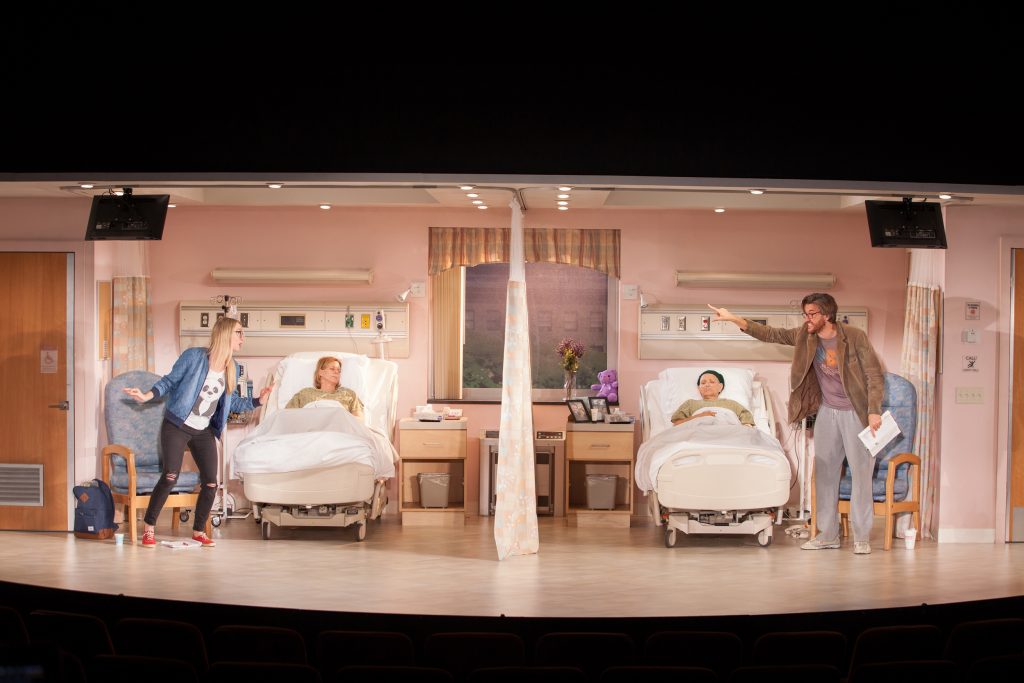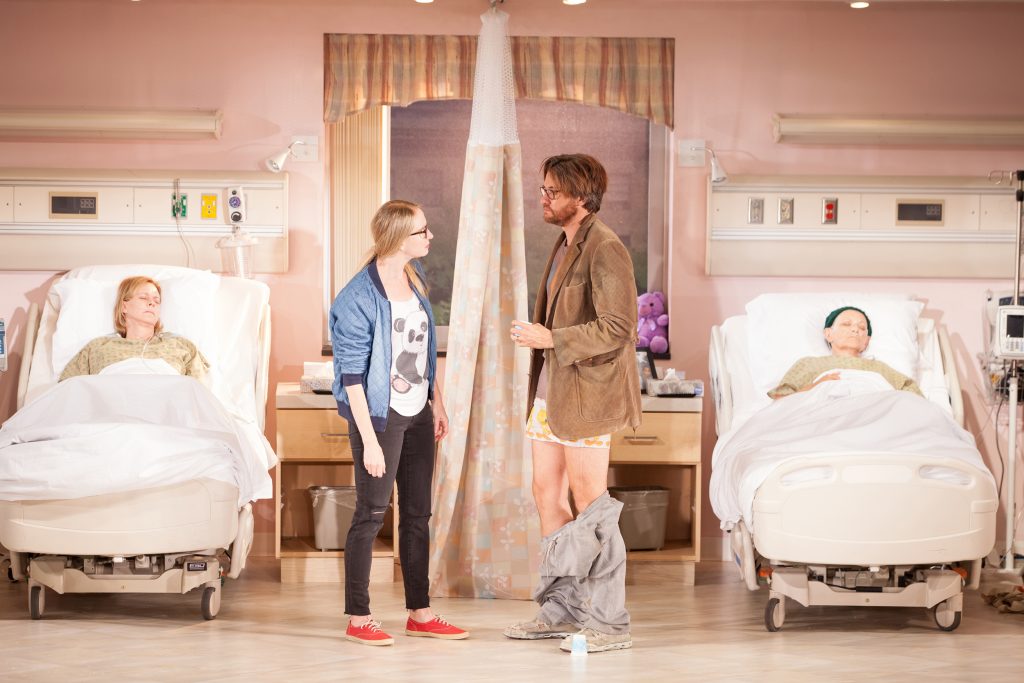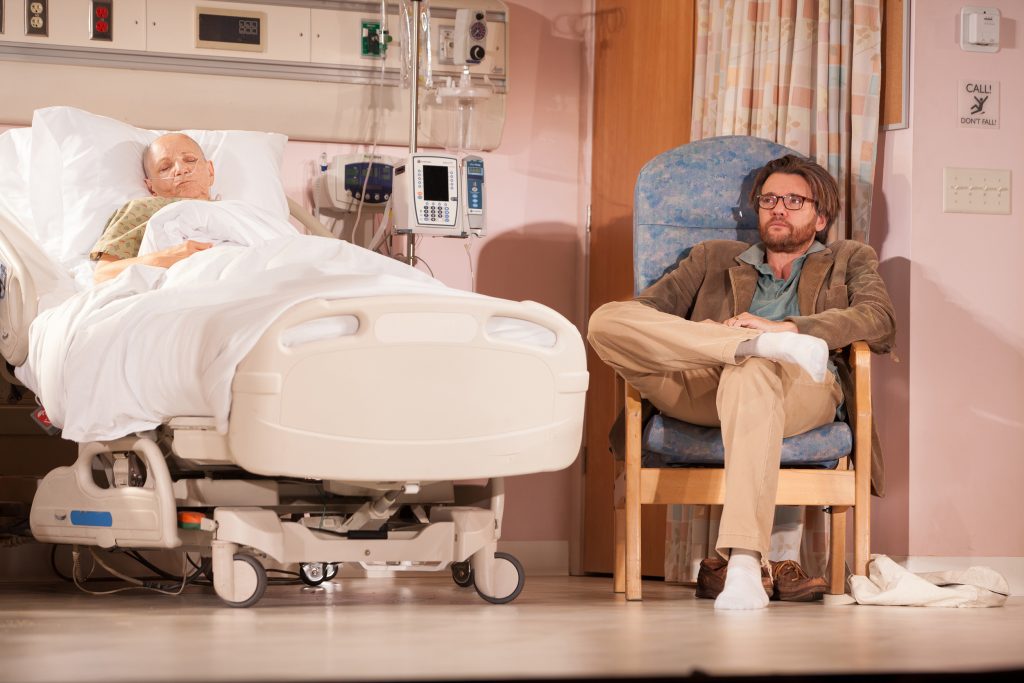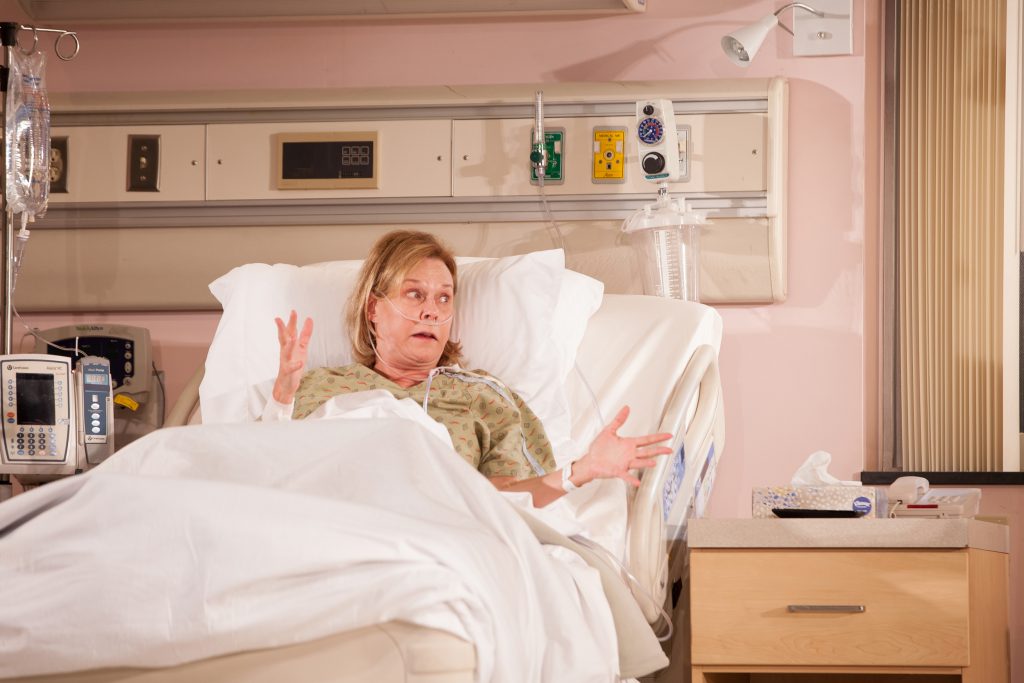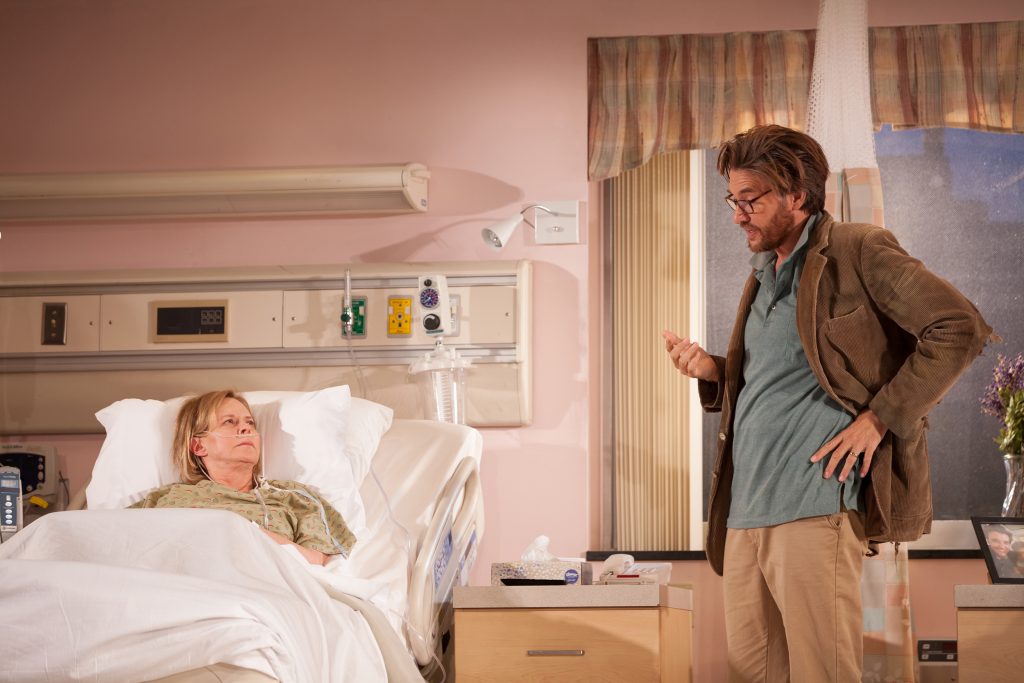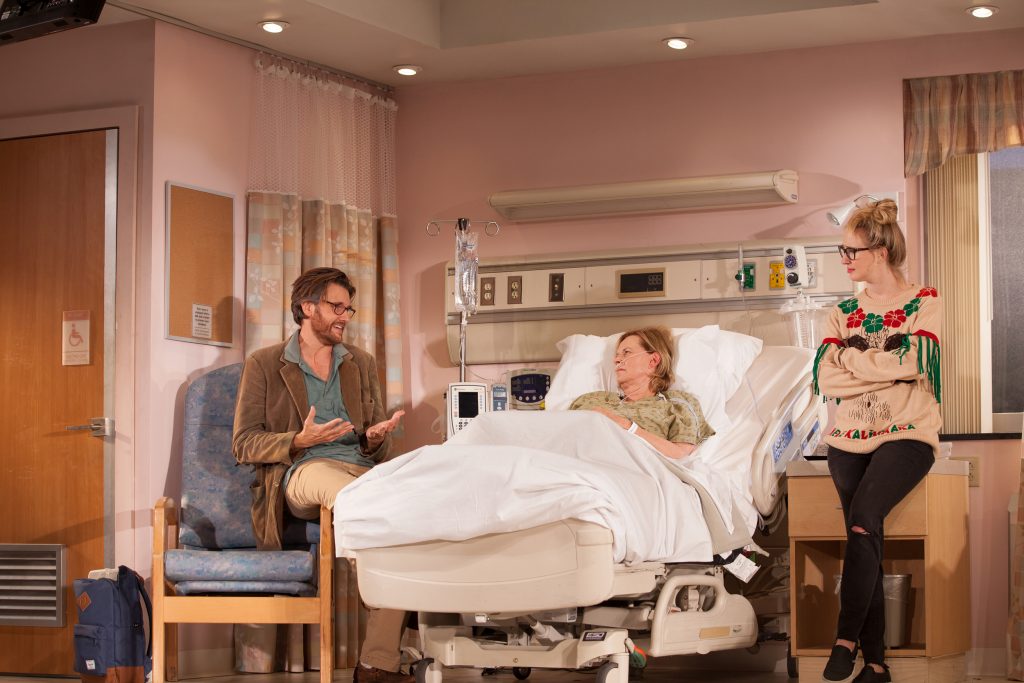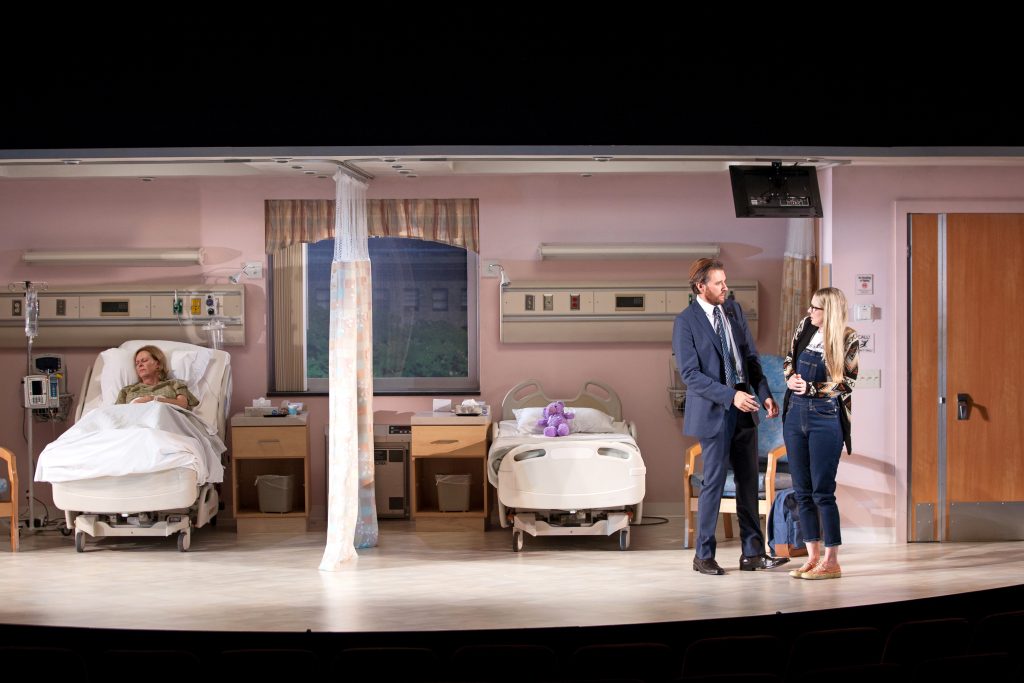DON’T ARGUE WITH ME, I HAVE CANCER
As the play begins, two women are asleep in hospital beds in a shared room with a curtain drawn between them. A tightly wound young woman, Karla (Halley Feiffer) is on one side of the curtain, with the younger of the two patients. She is an aspiring comedian, trying to come up with a rape fantasy joke around her vibrator. Some of the jokes are very funny, and some not so much, but all are uncensored, flirting with outright vulgarity.
Then the meet-cute. Quirky, ill-kempt Don (Jason Butler Harner) arrives on the other side of the curtain, visiting the older woman. He grows increasingly offended by Karla’s comical sexual ramblings, and they fight’”with the curtain drawn between the two beds, unable to see one another. That’s our entry into this often strange, but sometimes highly entertaining hybrid. It’s a rom-com, family drama, sex farce, and wish fulfillment fantasy all rolled into one zippy play without an intermission.
The curtain stays drawn between Karla and Don for quite a while before they finally meet face-to-face. The two women, their mothers, don’t speak, also for quite a while. Finally, Karla’s bellicose mother, Marcie (JoBeth Williams), drops a druggy comic bombshell, when, as Karla tells Don about her sister, Marcie stirs just long enough to acidly spit out, “She’s dead!” Later, when she awakens for real, she bellows, “Who do I have to fuck to get some fizzy water around here?”
It takes rather a long time for Karla and Don to bicker their way to romance (though awkward sex in her mother’s hospital bathroom, with a jaw-droppingly neurotic commentary from Karla, might not be “romance” exactly). Lastly, Don’s mother, Geena (Eileen T’Kaye) finally joins the party. While Marcie seems on her way to recovery after cancer surgery, Geena seems to be nearing the end of her seven-year battle with the disease. Both Karla and Don have complicated relationships with their mothers, but Karla and Marcie are locked in an ugly war of attrition’”a war that, cancer notwithstanding, Karla is losing. The narrative barrels along, with some very funny physical action and enjoyably crude jokes along the way. There’s a quasi-reconciliation, and boom, we’re out on the street, 80 minutes after the curtain rises, wondering what the hell just happened.
Feiffer is also the playwright. She and director Trip Cullman have a keen sense of when their audience might lose its patience. Just at the point when we’ve had it with the drawn curtains, they’re opened. When the silence of the sleeping patients is about to become intolerable, Marcie speaks. It’s the same when Karla and Don finally kiss, when Geena finally speaks up, and when Marcie finally shows she loves her daughter. I don’t know if this indicates great timing on Feiffer’s part, or something more like a teen-ager pushing her parents right to edge before retreating into feigned innocence.
The play went through a long development process along its journey, and Feiffer acknowledges in interviews that she initially danced around the more serious elements of the story. She realized she was deflecting pain in much the same way her characters do. I wish she had gone farther. These characters seem to be formed from an even deeper sense of sadness, loss, and hopelessness than Feiffer allows them to explore. The elements are all there, but just when a scene seems to be on the verge of being unbearable for the characters, Feiffer pulls back from the edge. It’s the same action she takes with stage and narrative devices to keep from losing the audience. Yet, while losing the audience would be a disaster, the characters losing themselves in the sweep of their own feelings would be sublime.
As the two very different mothers, JoBeth Williams and Eileen T’Kaye are stunning. At first, Williams makes it seem that Marcie devours Karla more out of habit than anything else. As Marcie’s specific grievance grows clearer, the text pushes the character into a not entirely earned resolution, but Williams deftly underplays, making the transition feel more authentic than it might in another actress’s hands.
T’Kaye has a forceful presence that is an effective yang to the yin of Geena’s gentler nature. Jason Butler Harner is a fine actor who seems unsteady here. When he embraces the physical comedy of the role, the character’s emotional transitions can feel glib. In the later sections, when his performance is more subdued (and more effective), his earlier pratfalls and neurotic tics don’t seem to be qualities of the same person.
Feiffer is always watchable. Happily, she never takes refuge in the kind of theatrical “kookiness” that some instinctively fall back on when playing an “unlikeable” character’”notably in the bathroom sex scene. When Don goes down on Karla, and she keeps yammering on about her abandonment and father issues, Feiffer plays the broadly funny yet genuinely creepy sequence without a hint of self-consciousness.
Still, I’m not entirely sure Feiffer’s presence on stage serves the play. It makes for awkward moments when other characters tell Karla her comedy is funny’”which, however unintentional, comes across as the playwright telling us how funny her own acting and writing is. More damaging is Feiffer losing the perspective of being in the audience. Had she been able to watch, she might have seen that the (very funny) overheard episodes of a Law & Order S.V.U. come across as meta parody, taking the audience right out of the play. She might also have seen the moments that threaten to undermine the actors. But most importantly, she might have seen that her true voice is nearer to Anton Chekhov than to Neil Simon.
photos by Chris Whitaker
A Funny Thing Happened on the Way to the Gynecologic Oncology Unit
at Memorial Sloan Kettering Cancer Center of New York City
Gil Cates Theater
Geffen Playhouse, 10886 Le Conte Ave
ends on October 8, 2017
for tickets, call 310.208.5454 or visit Geffen

